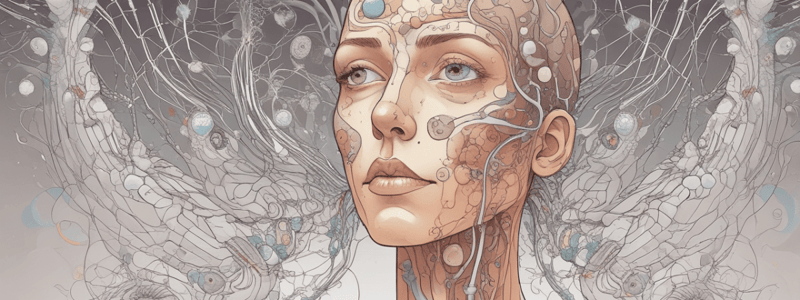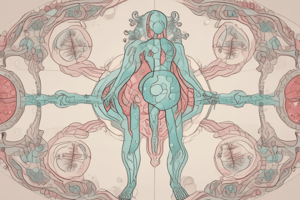Podcast
Questions and Answers
What is a characteristic of steroid hormones in terms of solubility?
What is a characteristic of steroid hormones in terms of solubility?
- They are soluble in lipids and insoluble in water (correct)
- They are soluble in both water and lipids
- They are insoluble in both water and lipids
- They are soluble in water and insoluble in lipids
What is the primary function of aldosterone?
What is the primary function of aldosterone?
- Sex determination
- Regulation of metabolism
- Cell signaling
- Osmoregulation (correct)
Why do steroid hormones require a transport protein in the blood?
Why do steroid hormones require a transport protein in the blood?
- Because they are too large to be transported alone
- Because they are too unstable to be transported alone
- Because they are hydrophobic and cannot dissolve in water-based blood (correct)
- Because they are too small to be transported alone
What is the approximate half-life of cortisol?
What is the approximate half-life of cortisol?
How do steroid hormones differ from non-steroid hormones in terms of their mode of action?
How do steroid hormones differ from non-steroid hormones in terms of their mode of action?
What is the primary mechanism of thyroid hormone action on target tissues?
What is the primary mechanism of thyroid hormone action on target tissues?
What is the role of G-proteins in non-steroid hormone action?
What is the role of G-proteins in non-steroid hormone action?
What is the result of the binding of a hormone to its receptor in non-steroid hormone action?
What is the result of the binding of a hormone to its receptor in non-steroid hormone action?
What is the location of the receptors for steroid hormones?
What is the location of the receptors for steroid hormones?
What is the ultimate result of steroid hormone action on target cells?
What is the ultimate result of steroid hormone action on target cells?
What is the role of adenyl cyclase in non-steroid hormone action?
What is the role of adenyl cyclase in non-steroid hormone action?
What type of regulation is involved in the changes in ion or nutrient levels in the blood?
What type of regulation is involved in the changes in ion or nutrient levels in the blood?
Which of the following is NOT a main endocrine gland?
Which of the following is NOT a main endocrine gland?
What is the term for the blood supply connecting the hypothalamus and pituitary?
What is the term for the blood supply connecting the hypothalamus and pituitary?
What type of feedback loop is involved in the regulation of hormone release?
What type of feedback loop is involved in the regulation of hormone release?
Who shared a Nobel Prize in 1977 for their research on hypothalamic releasing hormones?
Who shared a Nobel Prize in 1977 for their research on hypothalamic releasing hormones?
What is the function of the hypothalamus in the context of the endocrine system?
What is the function of the hypothalamus in the context of the endocrine system?
Which hormone is responsible for stimulating the production of ACTH, which in turn activates the cortisol axis?
Which hormone is responsible for stimulating the production of ACTH, which in turn activates the cortisol axis?
What is the primary function of Antidiuretic hormone/Vasopressin (ADH)?
What is the primary function of Antidiuretic hormone/Vasopressin (ADH)?
Which hormone is synthesized in the lactotrophe cells of the anterior pituitary and is composed of 199 amino acids?
Which hormone is synthesized in the lactotrophe cells of the anterior pituitary and is composed of 199 amino acids?
What is the weight and diameter of the pituitary gland?
What is the weight and diameter of the pituitary gland?
Which hormone is responsible for stimulating the production of LH and FSH, which in turn stimulate the gonads?
Which hormone is responsible for stimulating the production of LH and FSH, which in turn stimulate the gonads?
Which of the following hormones is released from the posterior pituitary and is involved in regulating sleep cycles?
Which of the following hormones is released from the posterior pituitary and is involved in regulating sleep cycles?
Which hormone is involved in the regulation of basal metabolic rate and thermogenesis?
Which hormone is involved in the regulation of basal metabolic rate and thermogenesis?
What is the primary function of prolactin in the body?
What is the primary function of prolactin in the body?
Which hormone is responsible for stimulating the release of testosterone in the testes?
Which hormone is responsible for stimulating the release of testosterone in the testes?
What is the effect of vasopressor actions of antidiuretic hormone (ADH) on vascular smooth muscle cells?
What is the effect of vasopressor actions of antidiuretic hormone (ADH) on vascular smooth muscle cells?
Which hormone is involved in the regulation of water reabsorption in the kidneys?
Which hormone is involved in the regulation of water reabsorption in the kidneys?
What is the effect of oxytocin on uterine smooth muscle cells during late pregnancy?
What is the effect of oxytocin on uterine smooth muscle cells during late pregnancy?
Hormones are found only in animals and not in plants.
Hormones are found only in animals and not in plants.
The heart produces a hormone that regulates body fluid volume and blood pressure.
The heart produces a hormone that regulates body fluid volume and blood pressure.
Hormones are secreted only by endocrine glands.
Hormones are secreted only by endocrine glands.
All hormones are amino acid derivatives.
All hormones are amino acid derivatives.
Leptin is produced by the placenta.
Leptin is produced by the placenta.
Hormones are not essential for our everyday survival and control.
Hormones are not essential for our everyday survival and control.
Tyrosine is used to synthesize Melatonin hormone
Tyrosine is used to synthesize Melatonin hormone
Catecholamines regulate metabolism in the body
Catecholamines regulate metabolism in the body
Dopamine stimulates the release of certain anterior pituitary hormones
Dopamine stimulates the release of certain anterior pituitary hormones
The hypothalamus is part of the peripheral nervous system.
The hypothalamus is part of the peripheral nervous system.
The portal circulation connects the pituitary gland to the hypothalamus.
The portal circulation connects the pituitary gland to the hypothalamus.
Atrial-natriuretic peptide (ANP) is produced by the pituitary gland
Atrial-natriuretic peptide (ANP) is produced by the pituitary gland
Follicle-stimulating hormone (FSH) stimulates the maturation of eggs in the ovaries and sperm in the testes
Follicle-stimulating hormone (FSH) stimulates the maturation of eggs in the ovaries and sperm in the testes
Humoral regulation involves changes in hormone levels that initiate or inhibit the secretion of another hormone.
Humoral regulation involves changes in hormone levels that initiate or inhibit the secretion of another hormone.
Growth hormone is a peptide hormone
Growth hormone is a peptide hormone
Thyrotropin-releasing hormone (TRH) is a small peptide hormone released by the pituitary gland.
Thyrotropin-releasing hormone (TRH) is a small peptide hormone released by the pituitary gland.
The negative feedback loop is involved in the regulation of hormone release from the adrenal glands.
The negative feedback loop is involved in the regulation of hormone release from the adrenal glands.
The autocrine control system involves the release of hormones that affect nearby cells or the same cell that produced the hormone.
The autocrine control system involves the release of hormones that affect nearby cells or the same cell that produced the hormone.
Inhibiting gonadal function is a primary function of oxytocin.
Inhibiting gonadal function is a primary function of oxytocin.
The hypothalamic-anterior pituitary pathway regulates the release of insulin from the pancreas.
The hypothalamic-anterior pituitary pathway regulates the release of insulin from the pancreas.
Thyroxine (T4) and Triiodothyronine (T3) are synthesized in the hypothalamus.
Thyroxine (T4) and Triiodothyronine (T3) are synthesized in the hypothalamus.
FSH stimulates the production of testosterone in the testes.
FSH stimulates the production of testosterone in the testes.
The adrenal glands produce only glucocorticoids (cortisol).
The adrenal glands produce only glucocorticoids (cortisol).
The posterior pituitary synthesizes and stores oxytocin and antidiuretic hormone.
The posterior pituitary synthesizes and stores oxytocin and antidiuretic hormone.
The risk of thyroid cancer increases 100 times due to autoimmune destruction of adrenal cortex.
The risk of thyroid cancer increases 100 times due to autoimmune destruction of adrenal cortex.
Addison's Disease is characterized by high cortisol levels.
Addison's Disease is characterized by high cortisol levels.
Type 1 diabetes can be managed with diet and exercise alone.
Type 1 diabetes can be managed with diet and exercise alone.
The cut point for diagnosing diabetes is an HbA1c level of ≥5.5%.
The cut point for diagnosing diabetes is an HbA1c level of ≥5.5%.
Microvascular complications of diabetes include Myocardial Infarction.
Microvascular complications of diabetes include Myocardial Infarction.
Type 1 Diabetes typically has a late onset.
Type 1 Diabetes typically has a late onset.
Flashcards are hidden until you start studying
Study Notes
-
Hormones are classified into two categories: non-steroid hormones, which are amino acid derivatives, peptides, or proteins, and steroid hormones, which are lipid-soluble and derived from cholesterol.
-
Non-steroid hormones are water-soluble, lipid-insoluble, and cannot pass through the cell membrane, so they act through second messengers, binding to receptors on cell membranes.
-
Steroid hormones are lipid-soluble, can pass through the cell membrane directly, and enter the cell, triggering transcription of target genes to mRNA, which directs protein synthesis.
-
Endocrine control systems involve autocrine, paracrine, and endocrine regulation of hormone release, which can be influenced by humoral, hormonal, or neural factors.
-
The hypothalamus-pituitary axis is a key component of the endocrine system, with the hypothalamus controlling the release of hormones from the anterior and posterior pituitary.
-
The hypothalamus produces several releasing hormones, including thyrotropin-releasing hormone (TRH), corticotropin-releasing hormone (CRH), and gonadotropin-releasing hormone (GnRH), which stimulate the production of thyroid-stimulating hormone (TSH), adrenocorticotropic hormone (ACTH), and follicle-stimulating hormone (FSH), respectively.
-
The pituitary gland produces several hormones, including TSH, ACTH, growth hormone (GH), FSH, luteinizing hormone (LH), and prolactin (PRL), which regulate various physiological processes.
-
The thyroid gland produces thyroid hormones, including thyroxine (T4) and triiodothyronine (T3), which increase basal metabolic rate and thermogenesis, and regulate sympathetic nerve activity.
-
The adrenal glands produce glucocorticoids (cortisol), which regulate metabolism, and aldosterone, which is involved in osmoregulation.
-
The gonads (ovaries and testes) produce sex hormones, including testosterone and estrogen, which regulate reproductive processes.
-
The pancreas produces insulin, which regulates blood sugar levels.
-
Steroid hormones have a longer half-life than non-steroid hormones due to their complex structure with transport proteins.
-
Endocrinology is the study of hormones, which are chemical messengers that travel through the bloodstream to have an effect on other parts of the body.
-
Hormones are essential for everyday survival and control various physiological processes, including temperature, sleep, mood, appetite, metabolism, growth, puberty, fertility, and bone growth.
-
The main endocrine glands include the hypothalamus-pituitary axis, thyroid gland, adrenal glands, pancreas, and gonads.
Studying That Suits You
Use AI to generate personalized quizzes and flashcards to suit your learning preferences.




